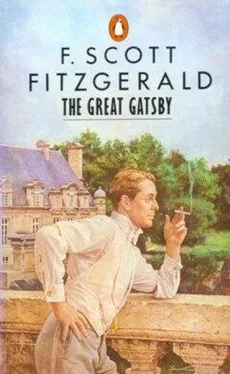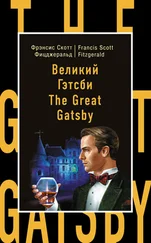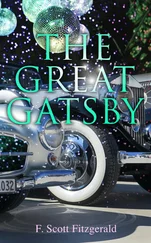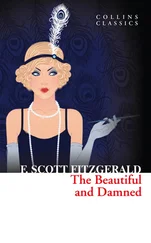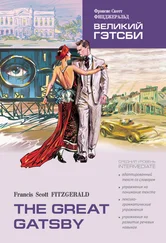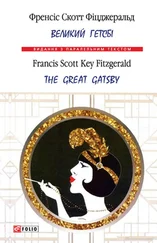Francis Fitzgerald - The Great Gatsby
Здесь есть возможность читать онлайн «Francis Fitzgerald - The Great Gatsby» — ознакомительный отрывок электронной книги совершенно бесплатно, а после прочтения отрывка купить полную версию. В некоторых случаях можно слушать аудио, скачать через торрент в формате fb2 и присутствует краткое содержание. Жанр: Классическая проза, на английском языке. Описание произведения, (предисловие) а так же отзывы посетителей доступны на портале библиотеки ЛибКат.
- Название:The Great Gatsby
- Автор:
- Жанр:
- Год:неизвестен
- ISBN:нет данных
- Рейтинг книги:5 / 5. Голосов: 1
-
Избранное:Добавить в избранное
- Отзывы:
-
Ваша оценка:
- 100
- 1
- 2
- 3
- 4
- 5
The Great Gatsby: краткое содержание, описание и аннотация
Предлагаем к чтению аннотацию, описание, краткое содержание или предисловие (зависит от того, что написал сам автор книги «The Great Gatsby»). Если вы не нашли необходимую информацию о книге — напишите в комментариях, мы постараемся отыскать её.
The Great Gatsby — читать онлайн ознакомительный отрывок
Ниже представлен текст книги, разбитый по страницам. Система сохранения места последней прочитанной страницы, позволяет с удобством читать онлайн бесплатно книгу «The Great Gatsby», без необходимости каждый раз заново искать на чём Вы остановились. Поставьте закладку, и сможете в любой момент перейти на страницу, на которой закончили чтение.
Интервал:
Закладка:
“Right you are,” agreed the policeman, tipping his cap. “Know you next time, Mr. Gatsby. Excuse me! ”
“What was that?” I inquired. “The picture of Oxford?”
“I was able to do the commissioner a favor once, and he sends me a Christmas card every year.”
Over the great bridge, with the sunlight through the girders making a constant flicker upon the moving cars, with the city rising up across the river in white heaps and sugar lumps all built with a wish out of non-olfactory money. The city seen from the Queensboro Bridge is always the city seen for the first time, in its first wild promise of all the mystery and the beauty in the world.
A dead man passed us in a hearse heaped with blooms, followed by two carriages with drawn blinds, and by more cheerful carriages for friends. The friends looked out at us with the tragic eyes and short upper lips of southeastern Europe, and I was glad that the sight of Gatsby’s splendid car was included in their somber holiday. As we crossed Blackwell’s Island a limousine passed us, driven by a white chauffeur, in which sat three modish negroes, two bucks and a girl. I laughed aloud as the yolks of their eyeballs rolled toward us in haughty rivalry.
“Anything can happen now that we’ve slid over this bridge,” I thought; “anything at all. …”
Even Gatsby could happen, without any particular wonder.
Roaring noon. In a well-fanned Forty-second Street cellar I met Gatsby for lunch. Blinking away the brightness of the street outside, my eyes picked him out obscurely in the anteroom, talking to another man.
“Mr. Carraway, this is my friend Mr. Wolfsheim.”
A small, flat-nosed Jew raised his large head and regarded me with two fine growths of hair which luxuriated in either nostril. After a moment I discovered his tiny eyes in the half-darkness.
“—So I took one look at him,” said Mr. Wolfsheim, shaking my hand earnestly, “and what do you think I did?”
“What?” I inquired politely.
But evidently he was not addressing me, for he dropped my hand and covered Gatsby with his expressive nose.
“I handed the money to Katspaugh and I said: ‘All right, Katspaugh, don’t pay him a penny till he shuts his mouth.’ He shut it then and there.”
Gatsby took an arm of each of us and moved forward into the restaurant, whereupon Mr. Wolfsheim swallowed a new sentence he was starting and lapsed into a somnambulatory abstraction.
“Highballs?” asked the head waiter.
“This is a nice restaurant here,” said Mr. Wolfsheim, looking at the Presbyterian nymphs on the ceiling. “But I like across the street better!”
“Yes, highballs,” agreed Gatsby, and then to Mr. Wolfsheim: “It’s too hot over there.”
“Hot and small—yes,” said Mr. Wolfsheim, “but full of memories.”
“What place is that?” I asked.
“The old Metropole.”
“The old Metropole,” brooded Mr. Wolfsheim gloomily. “Filled with faces dead and gone. Filled with fiends gone now forever. I can’t forget so long as I live the night they shot Rosy Rosenthal there. It was six of us at the table, and Rosy had eat and drunk a lot all evening. When it was almost morning the waiter came up to him with a funny look and says somebody wants to speak to him outside. ‘All right,’ says Rosy, and begins to get up, and I pulled him down in his chair.”
“Let the bastards come in here if they want you, Rosy, but don’t you, so help me, move outside this room.”
“It was four o’clock in the morning then, and if we’d of raised the blinds we’d of seen daylight.”
“Did he go?” I asked innocently.
“Sure he went.” Mr. Wolfsheim’s nose flashed at me indignantly. “He turned around in the door and says: ‘Don’t let that waiter take away my coffee!’ Then he went out on the sidewalk, and they shot him three times in his full belly and drove away.”
“Four of them were electrocuted,” I said.
“Five, with Becker.” His nostrils turned to be in an interested way. “I understand you’re looking for a business gonnegtion.”
The juxtaposition of these two remarks was startling. Gatsby answered for me:
“Oh, no,” he exclaimed, “this isn’t the man.”
“No?” Mr. Wolfsheim seemed disappointed.
“This is just a friend. I told you we’d talk about that some other time.”
“I beg your pardon,” said Mr. Wolfsheim, “I had a wrong man.”
A succulent hash arrived, and Mr. Wolfsheim, for getting the more sentimental atmosphere of the old Metropole, began to eat with ferocious delicacy. His eyes, meanwhile, roved very slowly all around the room—he completed the arc by turning to inspect the people directly behind. I think that, except for my presence, he would have taken one short glance beneath our own table.
“Look here, old sport,” said Gatsby leaning toward me, “I’m afraid I made you a little angry this morning in the car.”
There was the smile again, but this time I held out against it.
“I don’t like mysteries,” I answered, “and I don’t understand why you won’t come out frankly and tell me what you want. Why has it all got to come through Miss Baker?”
“Oh, it’s nothing underhand,” he assured me. “Miss Baker’s a great sportswoman, you know, and she’d never do anything that wasn’t all right.”
Suddenly he looked at his watch, jumped up, and hurried from the room, leaving me with Mr. Wolfsheim at the table.
“He has to telephone,” said Mr. Wolfsheim, following him with his eyes. “Fine fellow, isn’t he? Handsome to look at and a perfect gentleman.”
“Yes.”
“He’s an Oggsford man.”
“Oh!”
“He went to Oggsford College in England. You know Oggsford College?”
“I’ve heard of it.”
“It’s one of the most famous colleges in the world.”
“Have you known Gatsby for a long time?” I inquired.
“Several years,” he answered in a gratified way. “I made the pleasure of his acquaintance just after the war. But I knew I had discovered a man of fine breeding after I talked with him an hour. I said to myself: There’s the kind of man you’d like to take home and introduce to your mother and sister.” He paused. “I see you’re looking at my cuff buttons.”
I hadn’t been looking at them, but I did now. They were composed of oddly familiar pieces of ivory.
“Finest specimens of human molars,” he informed me.
“Well!” I inspected them. “That’s a very interesting idea.”
“Yeah.” He flipped his sleeves up under his coat. “Yeah, Gatsby’s very careful about women. He would never so much as look at a friend’s wife.”
When the subject of this instinctive trust returned to the table and sat down Mr. Wolfsheim drank his coffee with a jerk and got to his feet.
“I have enjoyed my lunch,” he said, “and I’m going to run off from you two young men before I outstay my welcome.”
“Don’t hurry, Meyer,” said Gatsby, without enthusiasm. Mr. Wolfsheim raised his hand in a sort of benediction.
“You’re very polite, but I belong to another generation,” he announced solemnly. “You sit here and discuss your sports and your young ladies and your—” He supplied an imaginary noun with another wave of his hand. “As for me, I am fifty years old, and I won’t impose myself on you any longer.”
As he shook hands and turned away his tragic nose was trembling. I wondered if I had said anything to offend him.
“He becomes very sentimental sometimes,” explained Gatsby. “This is one of his sentimental days. He’s quite a character around New York—a denizen of Broadway.”
“Who is he, anyhow, an actor?”
“No.”
“A dentist?”
Читать дальшеИнтервал:
Закладка:
Похожие книги на «The Great Gatsby»
Представляем Вашему вниманию похожие книги на «The Great Gatsby» списком для выбора. Мы отобрали схожую по названию и смыслу литературу в надежде предоставить читателям больше вариантов отыскать новые, интересные, ещё непрочитанные произведения.
Обсуждение, отзывы о книге «The Great Gatsby» и просто собственные мнения читателей. Оставьте ваши комментарии, напишите, что Вы думаете о произведении, его смысле или главных героях. Укажите что конкретно понравилось, а что нет, и почему Вы так считаете.
